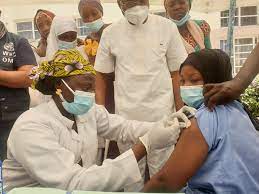A professor of virology at the College of Medicine, University of Lagos, Sunday Omilabu, says getting COVID-19 booster shots should not be the priority of the Federal Government.

According to the virologist, the FG should rather focus on ensuring that more Nigerians get vaccinated against COVID-19.
Prof. Omilabu said at least 40 per cent of eligible Nigerians should be vaccinated before considering purchasing the COVID-19 booster shots.
Recall that the Chairman, Presidential Steering Committee on COVID-19, Boss Mustapha, had said that the Federal government had concluded plans to get COVID-19 booster dose to help build a healthy level of anti-bodies.
Mustapha, who spoke during the COVID-19 national briefing in Abuja said the committee was targeting to vaccinate about half of the nation’s population by the end of January 2022.
While the overall population of eligible Nigerians targeted for COVID-19 vaccination to enable the country to reach herd immunity against the virus is 111,776,503; only 3,252,067 Nigerians had received their second dose and were fully vaccinated, representing only 2.9 per cent of the overall population of eligible persons.
But, Omilabu, who is also Director, Centre for Human and Zoonotic Virology, CMUL, said getting booster shots does not make sense if other eligible Nigerians are not vaccinated against the viral infection.
“Nigeria should try as much as possible to vaccinate a good proportion of the population before we start talking about booster shots; at least, if we cover about 40 per cent of Nigerians of that vaccine age.
“So, after the 40 per cent coverage, we can now be talking of whether to go for booster doses or not. If only about three million eligible Nigerians have only been fully vaccinated, will they go ahead and give the three million people booster vaccines? What about the remaining millions of eligible Nigerians?
“It doesn’t make any sense as long as those other million are still in existence and yet to be vaccinated, they will make nonsense of the immunity that the three million have. We have to cover more people with vaccines before we start talking about booster doses,” he said.
The virologist noted that the countries administering booster shots have vaccinated beyond 70 per cent of their population.
“Getting booster shots is not the priority now. People don’t have access to vaccines and that’s the problem, we need more vaccines to go round for the people and that’s my advice.
“There should be more vaccines to go round and those yet to be vaccinated should take advantage to get the jab so that it will increase our level of herd immunity,” the don said.
According to the World Health Organisation, booster doses are administered to a vaccinated population that has completed a primary vaccination series (currently one or two doses of COVID-19 vaccine depending on the product) when, with time, the immunity and clinical protection has fallen below a rate deemed sufficient in that population.
The objective of a booster dose is to restore vaccine effectiveness from that deemed no longer sufficient.
WHO’s Director of the Department of Immunisation, Vaccines and Biologicals, Dr. Katherine O’Brien, explained that the reasons for COVID-19 booster shots are if one is in a category of people that didn’t respond adequately to the first two doses received; if over time the immunity received and achieved as a result of being vaccinated starts to wane; and if the performance of the vaccines is less or inadequate against some of the variants of concern that have emerged.
Speaking during the WHO’s weekly programme, Science in 5, Dr. O’Brien said evidence shows that the vaccines that people have received are holding up really well to protect against severe disease, against hospitalisation, and against death.
Read Also: Increasing Rate Of High Blood Pressure In Children Worrisome – Cardiologist
“And that’s really the primary intent of the vaccines. What we also see is that we’re in a really inequitable place right now about who has already received the first and the second doses to provide protection against the severe outcomes in low-income countries and low middle-income countries that they are only at about one per cent, two per cent, five per cent of the population having received vaccine already.
“And that compares with a lot of vaccines having been deployed in high-income countries and upper-middle-income countries. So the focus now for the supply needs to be to protect those people who are not yet protected at all by vaccines. It will reduce transmission, it will reduce the likelihood of more variants emerging, and it will give us time to see more of the evidence about whether or not booster doses will eventually be needed.
“Nobody is safe until we all have the opportunity to be vaccinated, to be protected against the virus while vaccine coverage is increasing.
“And what that really means is getting doses now to those parts of the world that have not had adequate supply so far. While we’re doing that, it’s really important to continue the other measures that reduce transmission of the virus. That includes mask-wearing, hand-washing, not gathering in large crowds when you’re indoors, being in well-ventilated spaces. Those are the things that, along with the vaccines, are going to protect you both from disease and from the transmission of the virus.
“And that’s what the focus is right now. That’s what’s going to end this pandemic,” the expert said.
Kindly like us on Facebook















Discussion about this post